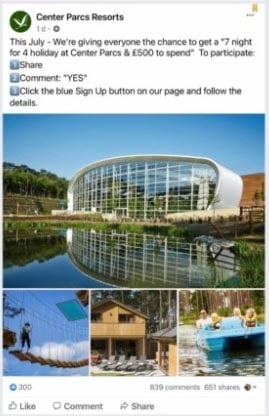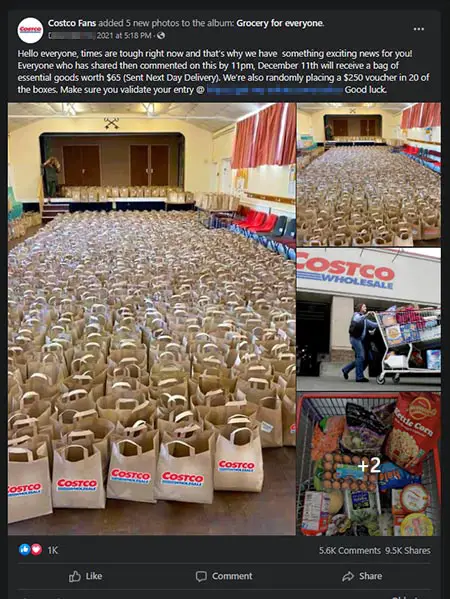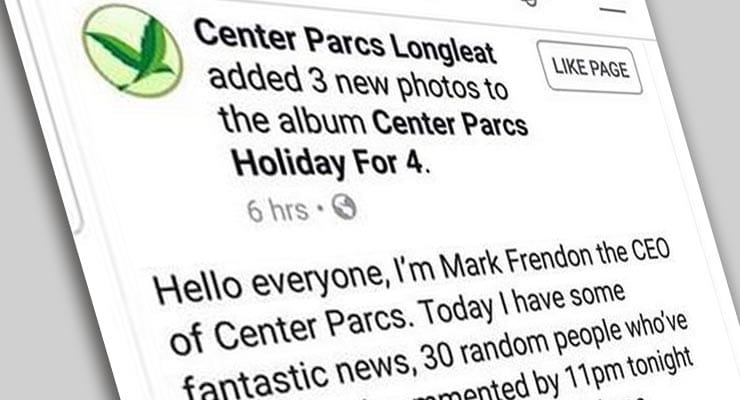What happens when you fall for a scam Facebook giveaway? Two case studies
We took a look at two more real life cases of people who clicked on fake competition or giveaway posts on Facebook to see how they were scammed, and to demonstrate why interacting with these types of posts is never worth the hassle.
One of the most enduring scams on Facebook is the classic fake promotion post. Such posts can claim you can win expensive prizes like holidays or cars by liking and sharing, while others claim popular brands are giving away coupons or gift cards to anyone who clicks.
It’s your typical cyber-trap. Entice a social media user with a too-good-to-miss opportunity, lure them in, and hit them with a scam. But what exactly are these scams? We take a look at two real life examples.
Names have been changed.
Case Study 1. James | Center Parcs
James saw a post claiming to come from Center Parcs offering the chance to win a holiday for those that liked and shared the post and clicked Sign Up.

You liked and shared the post, then clicked Sign Up. What happened?
I got taken to a webpage that congratulated me and told me I won holiday to Center Parcs and to confirm where I lived. I did that then it took me to a website called nationalconsumerweek.co.uk which claimed I could win a £1000 Center Parcs experience. It asked me three questions about my previous experiences with Center Parcs before then asking for my email address, full name, phone number and address.
What happened after that?
It then took me to another website asking me to sign up to deals with other websites and start subscriptions or accounts with them. I signed up for a free account with some company. But then the website said I need to sign up with another deal to continue. It seemed a little suspicious by now. Why would I have to sign up for accounts with insurance companies and gambling websites in order to get a prize to go to Center Parcs? I left the website and didn’t continue any further.
Sponsored Content. Continued below...
What happened after you left the website?
LOTS of spam. Then I remembered I had given my name, address, phone number and email to the first page I got taken to. I had emails from insurance companies, adult websites, survey websites, lottery websites, utility companies and job hunt websites. I had insurance companies calling me with auto-voicemails and text messages about debt recovery. I had to change my email address it got so bad and still get texts from time to time even after six months.
James fell for a scam competition designed to lure social media users to spammy marketing websites under false pretences. Those who fall for these scams will never get what was originally promised, and most don’t get anything of value at all. They will get, however, spammed since most of the sites want your contact details. You may even unwittingly sign up for SMS subscriptions or accounts that require monthly charges to keep going.
Never enter any competition or promotion that requires you to complete surveys or create accounts with third party companies. Also, don’t trust popular brand pages without the blue verification tick.
Case Study 2. Emma | Walmart
Emma saw a post claiming to come from Costco offering the chance to win $65 worth of goods and a $250 voucher for those that liked and shared the post and clicked a link.

You liked and shared the post, then clicked the link. What happened?
I was taken to a page confirming my entry and asking if I had shopped as Costco before. I said I had and it took me to a website asking me to fill in a survey to validate my entry. It asked for my personal information and my phone number which I entered.
What happened after that?
I filled in lots of information on another website and then it said I had entered but it kept forwarding me to other sites and they’re saying I could win other prizes that had nothing to do with Costco so I clicked away.
Sponsored Content. Continued below...
Did they contact you after that?
I never heard anything from Costco straight away but I did get lots of spammy messages from other companies. Then the Costco Facebook page that posted the original post messaged me on Messenger a few days later saying I had won the gift bag, only now it was a $500 gift bag. I replied back saying great but then they started asking for my information and finally they said I needed to pay a courier charge of $10 to get the bag sent to my address.
Did you pay it?
I paid it, figuring the reward would be much higher so it would be okay. Annoyingly I told a friend about 30 minutes later I won and they work with computer security and they told me it sounded like a scam and I shouldn’t pay to get a prize. They were right. It wasn’t the real Costco page, and nothing ever turned up. My friend told me to contact my bank as I gave these guys my card details. Thankfully I was quick enough to get the charge reversed and I have to get a new bank card.
Emma also stumbled on a scam competition that leads to spammy marketing websites, only this time it was coupled with an advanced fee fraud scam. The latter scam involves crooks trying to entice victims into paying relatively small amounts of money (or offering their bank details to make such a payment) in order to get a much larger pay-out (that doesn’t exist). The crooks then steal the money and details, leaving the victim at a loss.
Again, never complete surveys or create accounts to enter a competition or collect a prize, and certainly never pay money to get such a prize sent to you. This is a classic hallmark of a scam.
Continued below...
Thanks for reading, we hope this article helped, but before you leave us for greener pastures, please help us out.
We're hoping to be totally ad-free by 2025 - after all, no one likes online adverts, and all they do is get in the way and slow everything down. But of course we still have fees and costs to pay, so please, please consider becoming a Facebook supporter! It costs only 0.99p (~$1.30) a month (you can stop at any time) and ensures we can still keep posting Cybersecurity themed content to help keep our communities safe and scam-free. You can subscribe here
Remember, we're active on social media - so follow us on Facebook, Bluesky, Instagram and X
